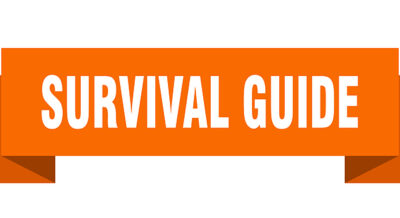In 1999, Chronicle Books published the first in a series of rather unique books, The Worst-Case Scenario Survival Handbook; and it sold ten million copies, launching a multimedia franchise. Over a dozen books followed, as well as games, TV series, and other merchandise.
Authors Joshua Piven and David Borgenicht built the books around extreme, need-based topics, like how to jump from a moving train or what to do if you have a tarantula sitting on you. Maybe it’s only me, but I’ve always wondered how to escape from a car hanging over the edge of a cliff!
I think it is about time to create a survival guide for authors because no matter how experienced you are or how wisely you manage your work, nothing will prepare you for the real life of a published author.
Here are some tips from the never-to-be-published edition of the Worst-Case Scenario Survival Guide: Author Edition.
How to Overcome Writer’s Block. Take multiple cleansing breaths to clear your head. Exhale. Grasp a midsize paperback book and strike yourself sharply between the eyes. If nothing comes to mind to write, repeat using a hardcover book. Writer’s block is a myth and only exists in writers who have other sources of income.
How to Get an Agent’s Attention at a Writer’s Conference. Take multiple cleansing breaths to clear your head. Exhale. Take a midsize paperback book and strike yourself sharply between the eyes. If the agent doesn’t look up and ask if you are okay, repeat using a hardcover book.
What to Do When You Realize an Interviewer Hasn’t Read Your Book. Take multiple cleansing breaths to clear your head. Exhale. If done over a Zoom call, mute your microphone and sing the second chorus of the legendary song “What Does the Fox Say?” It’s quite emotionally liberating. If you are interviewed in person, take a midsize paperback book and strike the interviewer sharply between the eyes.
What to Do When You Realize a Troll Is Trying to Wreck Your Amazon Reviews. Hold your breath and count to twenty. Exit Amazon.com and take a walk, noticing how the trees don’t care about your Amazon reviews and the squirrels and foxes couldn’t care less. Perspective gained.
What to Do When Your Friends and Family Who Urged You to Write a Book Still Haven’t Read the Free Copy You Gave Them. Hold your breath until you turn blue and pass out. If that doesn’t work, just let it go. They are your family, for Pete’s sake.
What to Do When the Pen You Are Using to Sign Books Runs Out of Ink. Always bring a dip pen with you so if this happens, you can find a way to extract some blood from your body. It is oddly appropriate to use it to sign books. The waiting customers won’t be creeped out at all. It’s perfectly normal behavior for an author. They will understand.
What to Do When a Person Hasn’t Heard of You Even Though Your Book Is a Bestseller. Take a deep breath and exhale. Welcome to the world of the published author.










